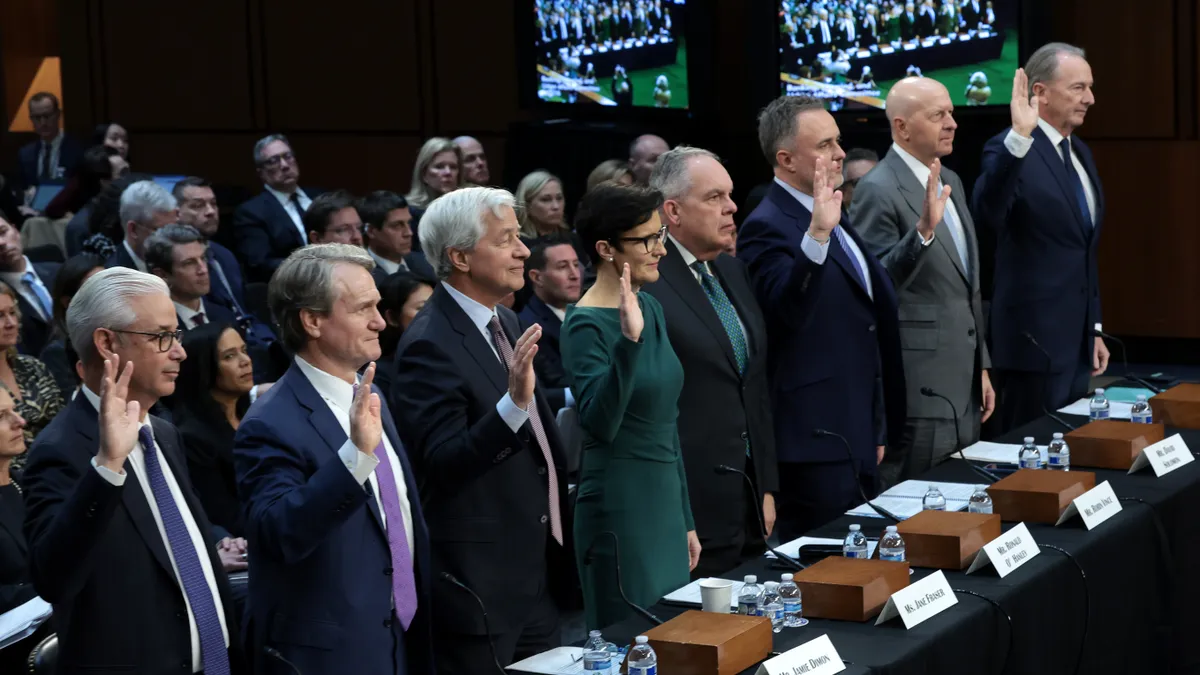The CEOs of the nation’s largest banks on Wednesday painted a bleak picture of the U.S. economy should regulators move forward with a proposal that would require banks to hold more capital to shield against losses.
“This rule will make services so uneconomical, you will likely see two outcomes: many banks will simply stop offering certain products and services, and those that do will have to charge more for them just to make it worth the service,” JPMorgan Chase CEO Jamie Dimon said in prepared remarks to the Senate Banking Committee on Wednesday.
Dimon, who was joined on the panel by Citi’s Jane Fraser, Bank of America’s Brian Moynihan, Goldman Sachs’ David Solomon, Wells Fargo’s Charlie Scharf, Morgan Stanley’s James Gorman, State Street’s Ronald O’Hanley and BNY Mellon’s Robin Vince, was referencing the Basel III endgame, a set of international standards developed by the Basel Committee on Banking Supervision in the wake of the 2007-08 financial crisis.
The Federal Reserve, Office of the Comptroller of the Currency and Federal Deposit Insurance Corp. released a 1,089-page proposal to implement the new capital standards, which would require the U.S.’s eight global systemically important banks to hold roughly 19% more capital on their balance sheets.
The rules have been widely criticized by bank trade groups, as well as Republican lawmakers, who on Wednesday, gave the CEOs of the nation’s largest banks ample time to voice their concerns.
Sen. Tim Scott, R-SC, the panel’s ranking member, called the proposal a “nightmare” that would harm Americans working paycheck-to-paycheck by requiring banks to hold “so much more capital on the sidelines.”
“But Americans shouldn't just hear about the concerns from those of us who are senators, we should hear from those who actually run the institutions that they have and trust in and have confidence in,” he said.
Increased capital requirements could push more activity outside the regulated banking system, several CEOs warned Wednesday.
“Ironically, a proposal meant to mitigate risk will actually increase risk,” Dimon said. “This rule will result in an increased shift away from regulated markets to less regulated markets.”
Fraser told lawmakers in her opening testimony that the rules would also put the U.S. at a competitive disadvantage on the international stage.
“The most likely result of increasing the cost of banks to offer a variety of products is that it would move more activity into the less regulated nonbank sector, which carries its own risk for consumers and the stability of the financial system. It would also diminish our industry's ability to compete internationally, especially with our European counterparts,” she said.
Solomon echoed Fraser’s sentiment, calling the proposals “punitive regulatory measures” that risk harming U.S. competitiveness in capital markets globally.
“The geopolitical stresses associated with Ukraine, China and the Middle East could impact economic growth and stability around the world. Against this backdrop, one headwind to U.S. economic recovery is the finalization of the new capital rules,” he said. “It's significantly more stringent than any other jurisdiction.”
Gorman called the measures “wholly unnecessary.”
“It will make credit more expensive, as everybody has said, make it less successful for consumers and businesses while harming the competitiveness of this economy. One of the great strengths of the U.S. economy is the banking system,” he said.
Dimon also blasted what he called a lack of economic analysis ahead of regulators’ introduction of the proposal.
"I fear that 'propose now, study later' has become a troublesome new theme in Washington," he said. “Qualitative calculations should have been done beforehand. We had 10 years to do this … It was not thoughtfully done.”
More than two dozens Republican lawmakers in September blasted the “paltry” 17 pages of impact analysis among the proposal’s 1,089 pages overall.
Democrats remain skeptical
Sen. Sherrod Brown, D-OH, the committee chair, pushed back on the CEOs’ criticism.
“What your banks want is to maximize quarterly profits, the cost of everything and everyone else be damned," he said.
In a statement released after the hearing, Brown likened the banks’ complaints about Basel III to the pushback firms mounted in the wake of the 2007-08 financial crisis.
“The big bank CEOs complained about capital requirements, just like they did with Dodd-Frank protections," Brown said, according to Reuters. "Strong rules, like capital requirements, protect workers, taxpayers and our economy by preventing big banks from taking on too much risk without the capital necessary to prevent financial crises and bailouts."
While Sen. Mark Warner, D-VA, said he shared concerns about the proposal’s impact on the economy, he bemoaned what he called the banking industry’s tendency to overreact to new regulations.
"I get extraordinarily frustrated that any time there is any proposed new regulation or rule, the industry reaction is, 'Oh my god, the sky is falling,'" he said.






















